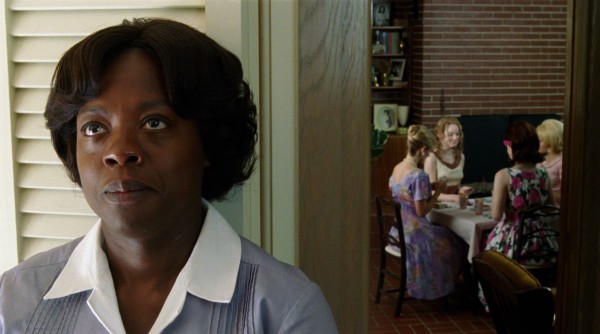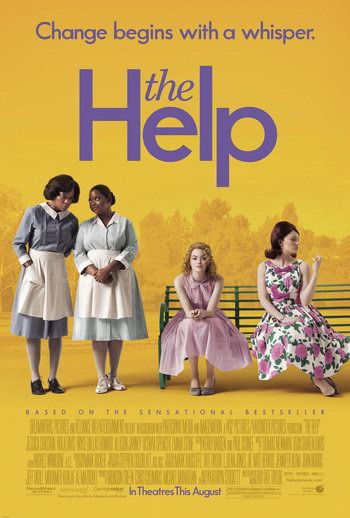
Appears too lightweight and frivolous initially but builds into something poignant and heart-rending. The Help is a resolutely perspective feminine and race-relations themed saga set in Jackson, Mississippi during the 1960’s. We see the duties and demands of African-American maids toiling for over-privileged white housewives who don’t know how to cook or change their own baby’s diaper and a myriad of other cases in point. Viola Davis (“Doubt”) and Octavia Spencer (“Seven Pounds”) are the routinely over-worked, underpaid and disrespected maids working in racist environments. At times their burdens of occupation will tickle your funny bones, and at other times their hardships will break your heart. Most of the white housewives are caricatures of layabout gossip queens, but Bryce Dallas Howard (“Hereafter”) memorably stands out as the merciless bigot Hilly Holbrook who is, one, cruel to her maid and, as well, mean to maids not her own. Emma Stone (“Easy A”) is Harper Lee counterpart Eugenia who was raised more by her maid than her mom, whom comes home to write a book that is anecdotal from maids working in the Jim Crow upheld south.
We meet several maids on their daily routines, and tour with them off-and-on in a story that changes course often, but doesn’t lose us. Some of them lose jobs and find new employers much up to satisfaction but more likely succumb to further dissatisfaction. There must be another three or four intriguing characters in the film, and that amounts to past a half dozen good movie characters that we care about. When one maid needs to request with humility for a $75 advance from stiff upper-crust white bourgeoisie so she can meet her two children’s education tuition fees, you know it’s a risky provocation to make in that given place and time. Throughout “The Help,” drama blooms from many unassuming episodes and we become emboldened by their outcomes.
 For all the stray dramatic pieces, the one pivotal turning point that has everybody in a roar is a new law proposition that would require all African-Americans in Mississippi to use designated toilets outside their white employer’s homes. Hilly Holbrook, the type of woman who would better yet have her maid walk out into a thunderstorm to go potty than to consent her bathroom, is the one that campaigns for this injunction. In this outcry, the maids of Jackson gather strength over fear to speak candidly for Eugenia’s book. Eugenia’s publisher (played by Mary Steenburgen) also wants a chapter entry of Eugenia’s experiences growing up with maids, and this leads to a pained discovery that her mother (Allison Janney) was more intolerant than tolerant.
For all the stray dramatic pieces, the one pivotal turning point that has everybody in a roar is a new law proposition that would require all African-Americans in Mississippi to use designated toilets outside their white employer’s homes. Hilly Holbrook, the type of woman who would better yet have her maid walk out into a thunderstorm to go potty than to consent her bathroom, is the one that campaigns for this injunction. In this outcry, the maids of Jackson gather strength over fear to speak candidly for Eugenia’s book. Eugenia’s publisher (played by Mary Steenburgen) also wants a chapter entry of Eugenia’s experiences growing up with maids, and this leads to a pained discovery that her mother (Allison Janney) was more intolerant than tolerant.
I was also very pleased to see Jessica Chastain again after I was awestruck by her lead performance in “The Tree of Life,” in a role as a clueless but good-natured housewife. Her character has no kitchen or any other homemaking talent, but she accumulates an expertise by uniting instead of segregating with her new maid. She is outcast by the other philistine housewives, particularly by Hilly Holbrook of course who steers the rest because she is the Queen. Taken as a whole, Bryce Dallas Howard has rarely been a good actress (count her as awful in “Lady in the Water,” “Terminator: Salvation”) but here she is a great villainous, a colonial twat so gloriously haughty that you can’t wait for her to get her just dessert.

Foremost, this is unmistakably a story about the maids of that time in the Civil Rights unrest. Their lives are constrained to a bubble, and so there appears to be little depth at the beginning. But then you hear their stories and spend time with them, and you either identify with them or empathize with them. Their husbands are curiously off-screen, as if to not let too many men get in the way of a feminized story. It’s not “Mississippi Burning” (1988) or “Malcolm X” (1992) let’s not fail to differentiate, but there is a venerable observance to the Civil Rights and convincing violence against blacks that is depicted with just about the right amount of subtlety for this form of content. This is a movie of comely packaged righteousness and compassion and Hallmark tears.
137 Minutes. Rated PG-13.
HISTORICAL DRAMA / FOOD FOR THOUGHT / WEEKEND FAMILY AND DINNER MOVIE
Film Cousins: “Mississippi Burning” (1988); “The Long Walk Home” (1990); “Malcolm X” 1992); “Rosewood” (1997).





